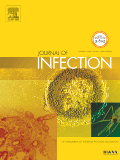
JOURNAL OF INFECTION
Scope & Guideline
Advancing the Frontiers of Infectious Disease Research
Introduction
Aims and Scopes
- Clinical Infectious Diseases:
The journal focuses on clinical studies that address the diagnosis, treatment, and management of infectious diseases in diverse patient populations. - Epidemiology and Public Health:
Research on the epidemiological trends of infectious diseases, including outbreak investigations and the impact of public health interventions, is a core area of focus. - Microbiology and Pathogenesis:
The journal publishes studies exploring the microbiological aspects of infections, including pathogen characteristics, resistance mechanisms, and host-pathogen interactions. - Emerging Infectious Diseases:
There is a strong emphasis on research related to emerging and re-emerging infectious diseases, particularly those influenced by global health events such as pandemics. - Antimicrobial Resistance:
The journal addresses the growing concern of antimicrobial resistance, including studies on resistance patterns, mechanisms, and the impact of antibiotic stewardship. - Innovative Diagnostics and Therapeutics:
The journal encourages submissions related to novel diagnostic tools and therapeutic interventions aimed at improving patient outcomes in infectious diseases. - Global Health Perspectives:
The Journal of Infection also incorporates studies that highlight global health issues related to infectious diseases, including socio-economic factors and healthcare disparities.
Trending and Emerging
- COVID-19 Research:
There is an overwhelming trend towards COVID-19-related research, including studies on its epidemiology, clinical outcomes, vaccine efficacy, and long-term sequelae. - Antimicrobial Stewardship and Resistance Studies:
Increased attention is being paid to antimicrobial stewardship programs and studies investigating the mechanisms and epidemiology of antimicrobial resistance. - Use of Machine Learning and AI:
Emerging research utilizing machine learning and artificial intelligence for predicting infection outcomes and improving diagnostics is gaining traction. - Global Health and Infectious Disease Surveillance:
Research focusing on global surveillance of infectious diseases and the impact of social determinants on health is increasingly emphasized. - Long COVID and Post-Acute Sequelae:
The exploration of long COVID and its multifaceted impact on health is an emerging area of research, reflecting growing concerns about the long-term consequences of the pandemic. - Metagenomic and Genomic Approaches:
There is a rising interest in using metagenomic and genomic sequencing techniques to study complex infections, pathogen diversity, and the microbiome's role in health and disease.
Declining or Waning
- Traditional Bacteriology:
Research focused solely on traditional bacteriology methods is declining as newer molecular techniques and metagenomics gain prominence in the diagnosis of infections. - Vaccine Hesitancy Studies:
There seems to be a reduction in studies specifically addressing vaccine hesitancy, as the immediate concerns surrounding COVID-19 vaccination have shifted to broader public health strategies. - Historical Infectious Disease Research:
Research focusing on historical perspectives of infectious diseases has waned, with a greater emphasis now on contemporary issues and real-time data analysis. - Single-Pathogen Studies:
There is a trend away from studies that focus on single pathogens in isolation, moving towards research that examines co-infections and the interactions between multiple pathogens. - Invasive Fungal Infections:
Although still important, the volume of research specifically dedicated to invasive fungal infections has decreased as more researchers focus on bacterial and viral pathogens, particularly in the context of COVID-19.
Similar Journals
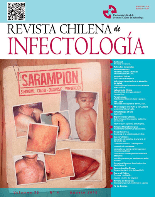
Revista Chilena de Infectologia
Advancing knowledge in infectious diseases and public health.Revista Chilena de Infectologia is an esteemed academic journal dedicated to the field of infectious diseases and public health. Published by the SOC CHILENA INFECTOLOGIA, this journal has been pivotal in disseminating crucial research findings since its inception in 2000. While operating under ISSN 0716-1018 and E-ISSN 0717-6341, it aims to contribute to the understanding of both local and global health issues, particularly within the context of Chile. Currently, it holds a Q4 ranking in both the Infectious Diseases and Public Health, Environmental and Occupational Health categories as of 2023, reflecting its unique position among emerging voices in the field. The journal aspires to foster collaboration among researchers, professionals, and students by offering a platform for innovative studies and discussions that address pressing health challenges. Although it is not an Open Access journal, access options through institutional subscriptions are encouraged for a comprehensive review of its significant contributions to infectious disease research.
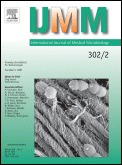
INTERNATIONAL JOURNAL OF MEDICAL MICROBIOLOGY
Exploring the Complexities of Microbial PathogenesisWelcome to the International Journal of Medical Microbiology, a leading publication in the field of microbiological research and infectious diseases, offered by Elsevier GmbH. Established in 2000, this esteemed journal provides a scholarly platform for the presentation of high-quality research, reviews, and innovations that bridge medical microbiology and clinical applications. With an impressive impact factor positioning it within the Q1 category across multiple disciplines, including Infectious Diseases, Microbiology, and Medicine, the journal is recognized for its rigorous peer-review process and significant contributions to advancing our understanding of microbial pathogenesis, diagnostics, and therapeutics. The International Journal of Medical Microbiology is committed to open access, promoting the dissemination of knowledge and accessibility for researchers, professionals, and students worldwide. Based in Munich, Germany, the journal continues to play a vital role in the global scientific community, fostering collaborations and inspiring future innovations in the fight against infectious diseases.
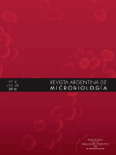
REVISTA ARGENTINA DE MICROBIOLOGIA
Unlocking the potential of open-access microbiological research.REVISTA ARGENTINA DE MICROBIOLOGIA, published by the ASOCIACION ARGENTINA MICROBIOLOGIA, stands as a prominent open-access journal in the field of microbiology and medicine since its establishment in 1979. With an ISSN of 0325-7541 and an E-ISSN of 1851-7617, this journal has paved the way for disseminating high-quality research while enhancing accessibility for academics and practitioners worldwide. The journal has achieved notable rankings, being classified in Q3 for Medicine (miscellaneous) and Q3 for Medical Microbiology in 2023, reflecting its commitment to advancing knowledge in these critical areas. Despite its relatively modest impact factors, it occupies a vital niche in the academic landscape, fostering collaborations and innovative research among experts. With Open Access available since 2013, REVISTA ARGENTINA DE MICROBIOLOGIA not only facilitates widespread distribution of valuable scientific information but also empowers researchers, professionals, and students to stay abreast of the latest findings and developments in microbiology. For those engaged in the evolving realm of microbiology, this journal serves as an essential resource for sharing insights and advancing the scientific community.

GERMS
Fostering a global dialogue on health equity and disease prevention.GERMS is a multidisciplinary journal published by the EUROPEAN ACAD HIV-AIDS & INFECTIOUS DISEASES, dedicated to advancing knowledge in the fields of epidemiology, immunology, infectious diseases, and microbiology. Since its inception in 2011, the journal has provided a crucial platform for researchers and practitioners to share innovative studies, clinical findings, and public health insights, with an eye on improving health outcomes globally. With an ISSN of 2248-2997 and a consistent publication trajectory leading up to 2024, GERMS is recognized in the third quartile across several categories, reflecting its growing impact and relevance in the scientific community. Authors and readers benefit from a range of access options, fostering the dissemination of vital research findings. As a journal situated in Romania, it also addresses regional health challenges while contributing to the broader discourse on infectious diseases and public health. GERMS is not just a repository of knowledge, but a vital resource for those engaged in combating infectious diseases and promoting health equity.

Journal of Pathogens
Innovating Solutions in Microbiology and Disease ControlJournal of Pathogens is a premier peer-reviewed journal published by HINDAWI LTD, focusing on the critical field of microbiology, infectious diseases, and the mechanisms of pathogen interactions with hosts. Since its inception in 2011 as an Open Access journal, it has aimed to provide a platform for high-quality research articles, reviews, and case studies that enhance our understanding of pathogenesis and advance the science of disease control. With its commitment to making research freely accessible, the journal attracts a global audience of researchers, professionals, and graduate students keen on exploring innovative findings and applications in the study of pathogens. While the journal does not currently have an established H-index or category quartiles, its relevance and importance in the field continue to grow as it seeks to bridge knowledge gaps and facilitate impactful discussions in infectious disease research. Located at Adam House, 3rd Floor, 1 Fitzroy Square, London W1T 5HF, England, the Journal of Pathogens invites submissions that contribute to the ever-evolving landscape of pathogen research and public health.

Mediterranean Journal of Infection Microbes and Antimicrobials
Connecting researchers to combat microbial threats.Mediterranean Journal of Infection Microbes and Antimicrobials is a distinguished open-access journal published by GALENOS PUBL HOUSE, dedicated to advancing the understanding of infectious diseases and microbiology. Since its inception in 2011, this journal has been a vital resource for researchers, professionals, and students interested in the intricate world of microbes and their impacts on human health. With its ISSN 2147-673X, the journal has progressively gained visibility, although it currently holds a Q4 ranking in multiple categories including Immunology and Microbiology, and Infectious Diseases for the year 2023. The journal operates from its headquarters in Istanbul, Turkey, and features a rich array of articles that contribute to the field’s body of knowledge. As a platform enhancing the accessibility of research, it invites submissions from global contributors to foster collaboration and innovation in tackling microbial challenges.
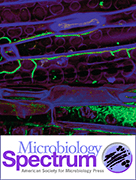
Microbiology Spectrum
Advancing microbiological research for a healthier world.Microbiology Spectrum is a prominent peer-reviewed journal published by the American Society for Microbiology, dedicated to advancing the field of microbiology through the dissemination of high-quality research. Since its inception in 2013 and continuing until 2024, the journal has established a strong presence in key domains such as microbiology, immunology, cell biology, and ecology, achieving impressive quartile rankings including Q1 in Infectious Diseases and Q1 in Immunology and Microbiology as of 2023. With an emphasis on open access to its scholarly content, Microbiology Spectrum aims to foster collaboration and knowledge sharing among researchers, professionals, and students alike. The journal's scope encompasses a diverse range of topics pertinent to the field, making it an essential resource for anyone involved in microbiological research and its applications. Researchers looking to publish their findings in a respected journal will find Microbiology Spectrum's robust impact factor and Scopus rankings serve as testament to its significance and influence within the academic community.

New Microbes and New Infections
Unveiling the latest breakthroughs in microbiology and infectious diseases.New Microbes and New Infections is an esteemed peer-reviewed journal published by Elsevier Sci Ltd that has been a prominent platform for disseminating groundbreaking research in the fields of Infectious Diseases and Microbiology since its establishment in 2013. With an impressive Open Access model, this journal ensures that vital research findings are readily accessible to researchers, healthcare professionals, and academics worldwide. Positioned in the Q2 category for Infectious Diseases and Q3 for Microbiology in 2023, it reaches a significant global audience, as demonstrated by its high Scopus rankings—#44 out of 344 in Medicine: Infectious Diseases, and #34 out of 182 in Immunology and Microbiology. The journal aims to inspire new ideas and foster collaborations by publishing high-quality research focused on novel microbes and infections, thus playing a crucial role in advancing science and public health in an era where understanding infectious agents is more vital than ever.
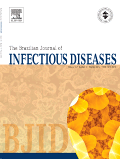
Brazilian Journal of Infectious Diseases
Advancing knowledge in infectious diseases, one study at a time.The Brazilian Journal of Infectious Diseases, published by Elsevier Brazil, is a premier open-access journal dedicated to advancing research and clinical practice in the field of infectious diseases. Since its inception in 2001, this journal has been pivotal in disseminating innovative studies and reviews that inform healthcare professionals and researchers alike. With an impressive impact factor reflected by its ranking in the second quartile for Infectious Diseases and third quartile for Medical Microbiology in 2023, the journal ranks #127 out of 344 in medicine – infectious diseases and #61 out of 140 in medical microbiology, showcasing its reputable standing in the scientific community. The Brazilian Journal of Infectious Diseases invites contributions that highlight significant findings, novel methodologies, and critical reviews aimed at enhancing patient care and public health initiatives. With an international readership and a focus on pressing issues in infectious diseases, it serves as an essential platform for knowledge exchange and collaboration among scholars and practitioners across Brazil and beyond. By reinforcing the importance of open access to scientific literature, this journal not only promotes transparency but also enhances the global discourse surrounding infectious diseases.

Journal of Global Infectious Diseases
Bridging local insights with global health solutions.Journal of Global Infectious Diseases, published by Wolters Kluwer Medknow Publications, serves as a pivotal resource in the field of infectious diseases, offering insightful research and critical analyses that contribute to global health discourse. Since its inception as an Open Access journal in 2009, it has aimed to disseminate knowledge on various facets of infectious diseases, fostering collaboration among researchers, clinicians, and public health professionals. With an impact factor indicative of its growing significance—ranked in the Q3 category of Infectious Diseases for 2023—this journal publishes a diverse range of studies, from basic science to clinical applications. Its dedicated contributions help address pressing health challenges and enhance knowledge sharing in an era where infectious diseases pose significant threats worldwide. Based in India, the journal not only highlights regional health issues but also connects to the broader global landscape, making it an essential platform for anyone interested in advancing the field.